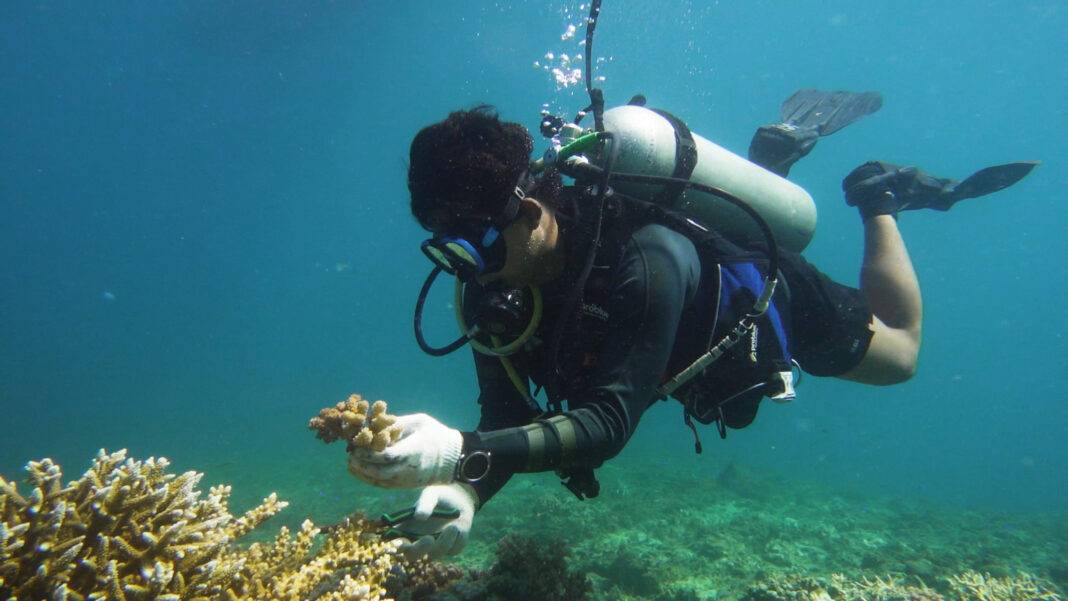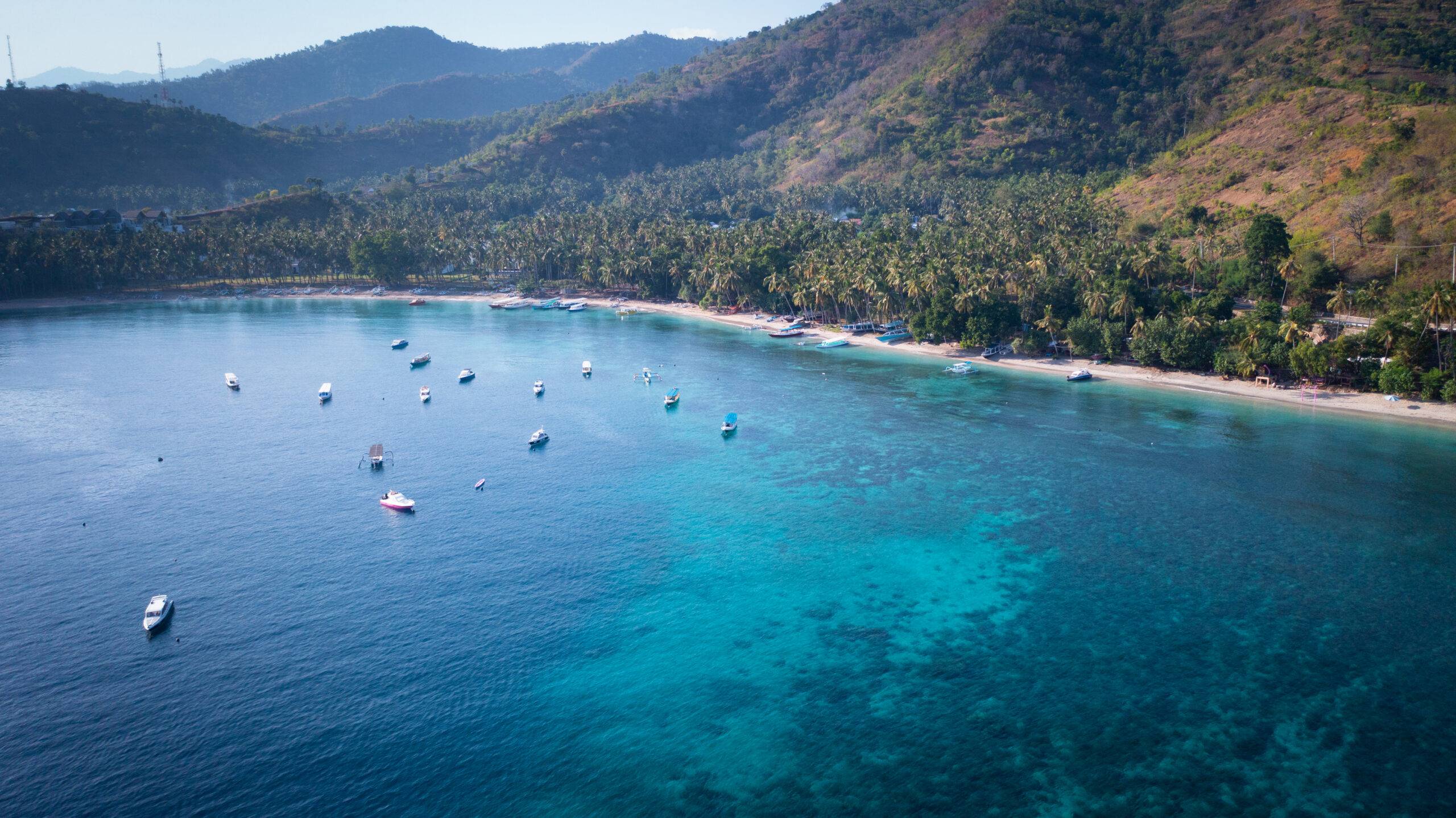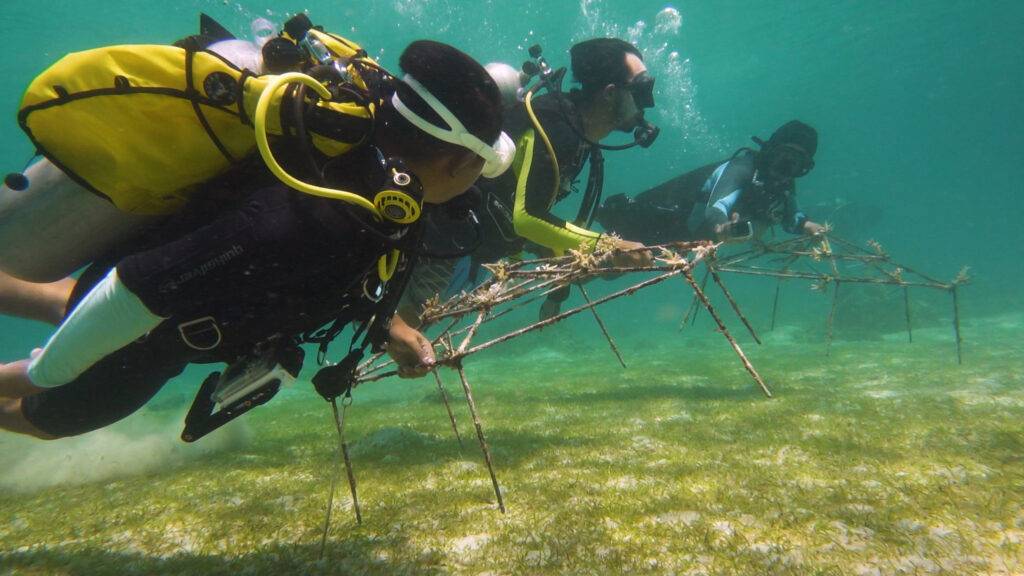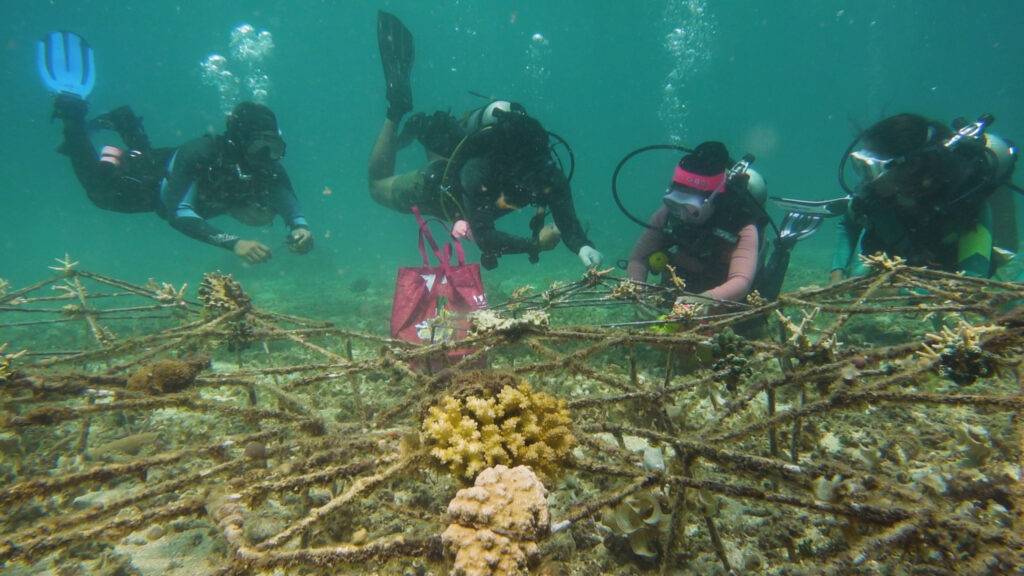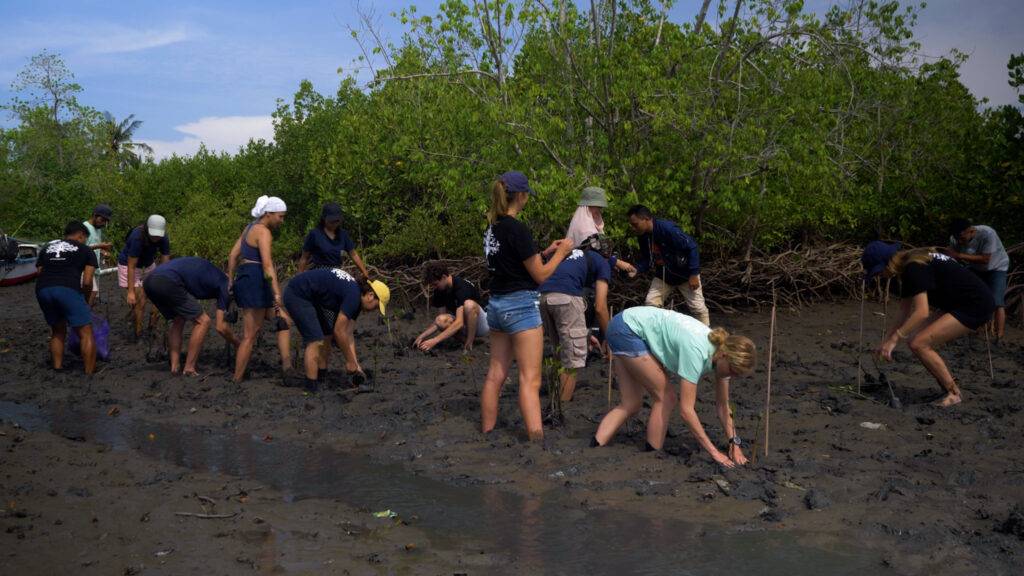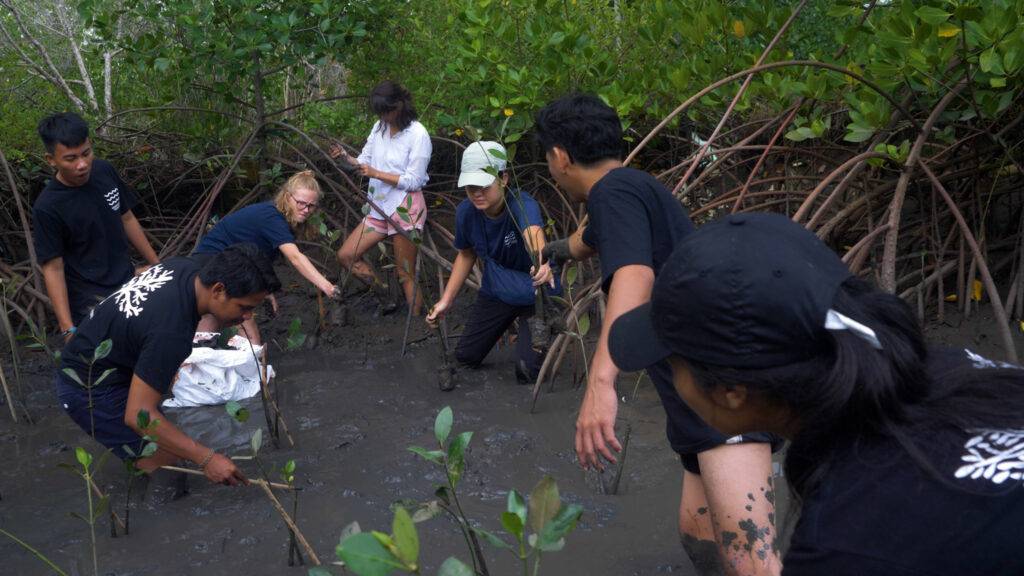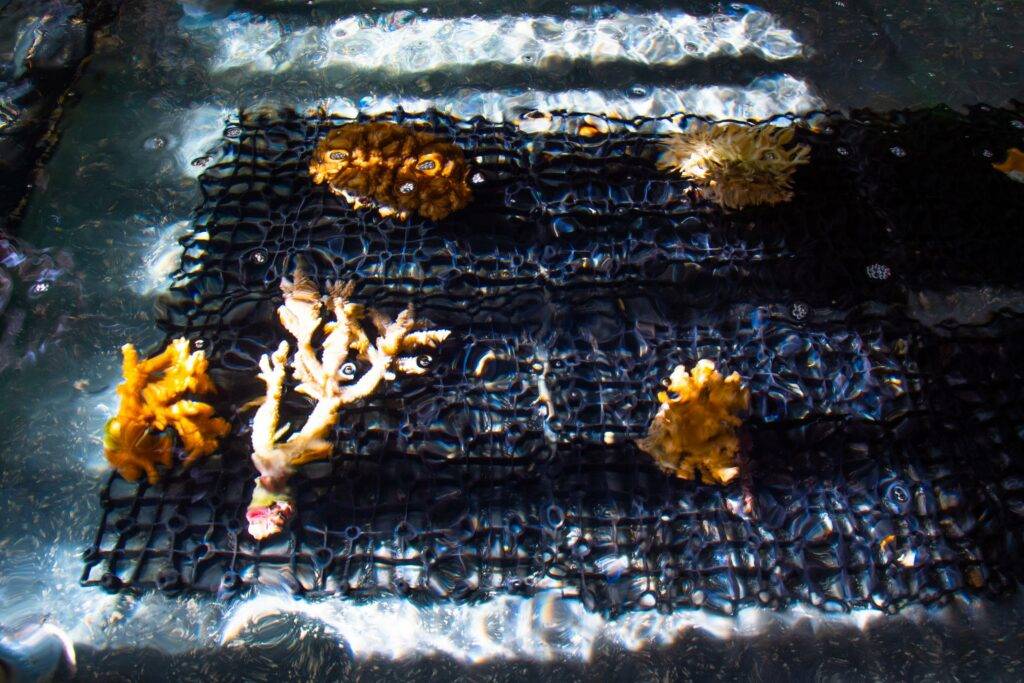On this island, scuba diving is a mission to protect the coral reefs.
Encompassing some 17,000 islands, Indonesia, the world’s largest archipelago, is surrounded by the ocean. It’s no secret that our oceans are warming at an alarming rate; this year, marine heatwaves have broken all previous records. An increase in global ocean temperatures causes coral bleaching and a devastating loss of biodiversity. Couple this with the impacts of a booming tourism industry, and Indonesia is experiencing the perfect storm for coral reef degradation.
The island of Lombok is a popular destination for snorkelers and divers, its waters filled with colorful reefs and tropical fish, turtles, and reef sharks. Here, the volunteer-driven, non-governmental Indonesia Biru (biru = blue) Foundation (IBF), established during the Covid lockdown of 2020, is taking steps to save the surrounding coral reefs. IBF’s founder, marine scientist Andrean (aka Andre) Saputra, created the organization to conduct coral research, restore damaged reefs, and promote coastal community development in Lombok and the Gilis (three small islands off Lombok’s northwest coast).
IBF’s headquarters are in Kecinan Bay, a quiet, sheltered stretch of sand along Lombok’s west coast. Its coral lab houses large tanks used to replicate the ocean’s conditions, allowing a team of volunteers to monitor the resistance of various coral species to rising ocean temperatures and acidity.
“It’s a coral reef hub for people who want to come and have discussions or snorkel and dive in the bay,” Andre says. “It’s also a facility for students and educational institutions to conduct research.”
When they’re not in the lab, the team regularly heads out on restoration dives just off the coast, during which they plant large metal “spiders” on the seabed in areas of damaged reef. As new coral can no longer grow on these affected reefs, the spiders act as an underwater trellis to support new coral growth. The team then collects small pieces of coral from the surrounding reefs and ties them to the spiders, encouraging them to grow and spread and, over time, create a new, healthy reef.
The team also carries out mangrove planting along Lombok’s southwest coast. Mangrove forests are essential for coastal protection, acting as a natural barrier against erosion and storms. Indonesia is home to twenty-three percent of the world’s mangroves — a habitat that acts as a carbon sink, storing up to four times more carbon than other tropical forests.
The growth rate of mangroves depends on a variety of factors, including the particular species planted and the prevailing environmental conditions, but they generally mature within ten to twenty years and live for about 100 years. To date, IBF has planted between 4,000 and 5,000 seedlings, restoring an area measuring nearly 11,000 square feet.
“People will grasp the idea and fall in love with something when they see, touch, and get involved with it,” Andre says. “That’s exactly what we’re doing with mangrove planting. It’s a hands-on experience to inspire the general public to do their part for conservation.”
Two students from Belgium, Femke and Lander, recently spent their summer holidays volunteering with IBF in Lombok.
“This summer we wanted to do diving; the fact that we could come here and do some restoration dives and actually contribute to something was a big plus,” says Lander. “We’re really looking forward to seeing how our work will have paid off.”
“It feels good to do something for a good cause. Our generation is really aware of climate change, so we really want to do our part, and it’s an easy way and a fun way to do it,” adds Femke.
What Can You Do?
IBF Volunteers can:
- Go on dives to brush the corals free of algae, scrub the spider structures, collect new coral fragments, and plant the fragments onto the spiders.
- Help maintain the coral tanks in the lab.
- Join a mangrove planting session.
- Participate in a beach cleanup event, collecting trash to be recycled. Beach cleanups are also a good way to get local coastal communities involved and educate kids about the importance of our oceans and coral reefs.
Some tips for diving:
- Choose reef-safe sunscreen: Avoid oxybenzone or octinoxate, which can damage coral
- Don’t touch corals or other marine life — observe them from a safe distance to avoid causing them harm or distress
- Avoid tour operators who lure marine wildlife such as whale sharks to the boat with food. All encounters with marine wildlife should ideally be natural and by chance.
Read more dispatches from around our pale blue dot:
In an economy dominated by palm oil plantations, a Malaysian community combines ecotourism with rainforest replanting — and engages young people in ancestral knowledge. Read the story.
The cows are fueling clean energy on the dairy farm at northern California's Point Reyes Farmstead Cheese Company. Read the story.
A team of social entrepreneurs in Southern Iowa aims to build a regional food system for the future — through technology, community, and connectivity. Read the story.
Rainforest Expeditions originated to fund scientific research. It simultaneously helps strengthen Indigenous culture, enrich communities, and preserve the environment — all while offering visitors a meaningful experience. Read the story.
An activist’s ecotourism program engages Gambian locals in protecting their environment — while boosting their livelihoods. Read the story.
Preserving genetic samples from a wide variety of alligators and crocs helps thwart their potential extinction. Read the story.
A garden in Burien, Washington, brings together a neighborhood and a school for at-risk students to address the community's needs. Read the story.
There are an estimated 100,000 sacred forests in India, offering rich biodiversity, spiritual value, and economic opportunities. Read the story.
Ancient woodlands have been in steady decline in the UK’s capital, London, for centuries. One community is rallying to rescue theirs. Read the story.
The critically endangered Popa langur gets help from a group of local youths. Read the story.
New York City is encouraging its lower-income residents to shop at farmers markets. And they’re giving them the Health Bucks to do so. Read the story
These night fliers are masters at pest control (and drawing tourists). Invite them to your yard with a bat-friendly garden. Read the story.
A warming climate and creative greenhouse has allowed a Nova Scotia farmer to grow crops not normally associated with Canadian temperatures. Read the story.
When turbine blades reach the end of their life, an Ohio company turns them into functional public art. Read the story.
Protecting the pachyderms (as well as the humans and crops) takes teams of brave, determined volunteers. Read the story.
The National Tree Seed Centre houses a collection that now represents 273 of Canada’s 720 tree and shrub species. Read the story.
When their beloved river was threatened by plans for a dam, residents of a small town in Bosnia and Herzegovina fought back to save the Neretvica River. Read the story.
A non-orthodox biologist fights for the protection of ecosystems in Guatemala by inviting local communities to participate. Read the story.
In the foothills of Boulder, Colorado, mushrooms are making it into mainstream forest management to help mitigate the spread of mega-fires. Read the story.
This Newfoundlander is determined to save marine life by removing trash from the ocean floor. Read the story.
LNG terminals have not only harmed aquatic ecosystems and dramatically reduced available fish, they’ve stolen people’s livelihoods. Read the story.
Solar dryers help Indian farmers increase their incomes and reduce food waste. Read the story.
A women-run cooperative in India uses ancient methods to produce luxurious, ethical silk. Read the story.
A special sales tax provides crucial funding for cleaning up a Florida lagoon to restore eelgrass, the manatees’ favorite food. Read the story.
New Orleans nonprofit groups are getting creative to reduce trash and waste at the iconic Mardi Gras festival. Read the story.
Reap the sweet benefits when you check into this forest-themed hotel, where you share the space with trees and bees. Read the story.
Siyam World, a Maldivian resort, protects an island’s ecosystem by taking care of its not-so-feral cats. Read the story.
New solar mini-grids now power a small rural Indian village — and have eliminated the incidence of deadly snake bites. Read the story.
In India, a farming startup aims to provide affordable greenhouses-in-a-box to more than a million small farmers. Read the story.
A protected North Atlantic reserve teeming with wildlife offers conservation lessons that may benefit us all. Read the story.
Promoting local tourism and environmental conservation, Travel with Mervis is one of the only woman-owned travel businesses in Malawi. Read the story.
Walking tours move tourists out of the country’s busy cities to connect with local nature and culture. Read the story.
A new kind of arable farming is creating jobs, addressing food insecurity, and combating climate change in Wales. Read the story.
An Australian wildlife organization dedicates its efforts to preserving endangered Tasmanian devils. Recently, they’re celebrating an important milestone — the birth of the group’s 500th joey. Read the story.
A company in India changes scrap into useful items, and changes some minds in the process. Read the story.
While Scotland is well known for its whiskey, it’s also home to threatened and elusive wildcats. Can a distillery help save the cats? Read the story.
Blue-green infrastructure in Bergen, Norway is helping Europe’s rainiest city prepare for increasing flood risks. Read the story.
With populations of tilapia and perch declining from overfishing, Ugandans have turned to previously neglected, small-sized fish for micronutrients. The result is healthier bodies and a healthier economy. Read the story.
As India deals with deadly extreme heat, urban planners try to turn down the temperature with architecture and design. Read the story.
In the absence of government action, two Nigerians created a game to encourage others to tackle environmental issues. Read the story.
This vulnerable Canadian island is proactively readying for climate impacts — and the lessons it’s learning are benefiting other coastal locales. Read the story.
In Tanzania, a high school student creates nitrogen-rich fertilizer using discarded clippings from his school’s hair salon. Read the story.
At first skeptical, farmers have embraced agroforestry — planting trees on farms — to boost crop production and local biodiversity. Read the story.
In 1997, a storm sent five million pieces of Lego into the ocean. A U.K. beachcomber helped build a citizen science project that aims to track those pieces and tell a story about plastic pollution. Read the story.
Walking the streets of her town and picking up plastic trash gives Lungile Beuta the materials she needs to create bags, backpacks, and more. Read the story.
Abdou Touré carried his childhood lessons from Boy Scouts into a life dedicated to inspiring environmental action in Dakar, Senegal. Read the story.
Ben Moore’s The Ugly Co. takes the fruit nobody wants — and makes it delicious. Read the story.
Restoring a tree canopy in India’s Assam State has reunited families of Hoolock gibbons after a 132-year separation. Read the story.
At Toronto Metropolitan University's Free Store, cast-offs find new homes with students – and nothing costs a thing. Read the story.
New Orleans is well-known for its music and food. Gregory Swafford aims to make it just as famous for its cleanliness, and he and his community are leading the way. Read the story.
In Western India, a nonprofit hires locals to spin yarn from plastic waste. Read the story.
Thaely is turning India’s plastic waste into a sneaker that’s green from heel to toe. Read the story.
New York City’s Rockaway residents are focused on restoring native species along the shoreline to protect dunes and thwart erosion. Read the story.
Taiwan’s specialty coffee doesn’t (yet) have the stellar global reputation of the country’s award-winning baristas. But coffee growers focused on sustainability aim to change that. Read the story.
Under the guidance of one man, India’s women are restoring their villages and protecting their children’s futures, one river at a time. Read the story.
Sanitation and potable water are a challenge in Makoko, Lagos, one of the country’s largest slums. But two young women have invented a water filtration system that aims to change that. Read the story.
In Kenya, a collaboration between government and nonprofits has revitalized farmland and created new prosperity. Read the story.
In Africa, climate change is testing centuries of accumulated and evolved indigenous knowledge. The methods, so far, are holding up. Read the story.
In Bali, banana leaves and bamboo serve as truly natural compostable packaging. Read the story.
An Indigenous botanist educates children about the environment, combining traditional practices with contemporary science. Read the story.
An ecomural made from hundreds of thousands of discarded bottlecaps is the product of many hands and symbolizes change in Mixco, Guatemala. Read the story.
The city government of Asheville, North Carolina, is inviting the community to create important pollinator habitats. Read the story.
Remote villagers in India saved their forest from destruction — and forged an emotional bond to ensure its long-term survival. Read the story.
A volunteer group has attracted supporters and beautified Saratoga Springs streets. Read the story.
The invasive hyacinth — the scourge of Africa’s Lake Victoria — offers an affordable way to feed livestock and provide local employment. Read the story.
Law clinics are empowering rural communities through climate education and projects specific to local challenges. Read the story.
In Utah's Colorado Plateau, butterfly counts bring together scientists and volunteers to collect data and educate those who participate. Read the story.
On Cape Cod, the Atlantic White Shark Conservancy's Gills Club inspires the next generation of female shark and ocean advocates. Read the story.
The owners of San Francisco’s Shuggie’s Trash Pie restaurant fight food waste deliciously. Read the story.
When the seas became overfished by commercial fishermen, the government created the Lagos Seafood Festival — inviting seafood lovers to indulge and everyone to learn more about sustainable aquaculture. Read the story.
On the island of Lombok in Indonesia, scuba diving volunteers are on a mission to protect the coral reefs. Read the story.
While farmers in Zimbabwe typically rely on chemicals, an inventor is thinking of the bees. Read the story.
Izzo Mwangi was appalled to find plastic bottles in the Maasai Mara National Reserve — so he constructed a tourist camp using them. Read the story.
In India, cultivating millets can protect farmers from losing crops to climate catastrophes. Read the story.
Gardeners and seed savers like Shirley Bellows rise to the challenge of safeguarding heirloom seeds before they are extinct. Read the story.
These new firefighters wear wooly jackets year-round. Read the story.
Climate change and disease have decimated the Keys’ coral reefs. But a lab has pioneered a process to accelerate their regrowth … and prioritize climate-resilient corals. Read the story.
The new Community Supported Fishery (CSF) program on Martha's Vineyard provides direct-to-consumer access to the freshest seafood available.Read the story.
An Iowa farmer traces his path from dreamer to do-er on a farm where nothing goes to waste. Read the story.
Part of the Paris resilience strategy adopted in 2017, Les Cours Oasis (“Oasis Courtyards”) is a project that funds schoolyard renovations. Read the story.
The Lights Out Philly initiative is helping to protect birds from glass collisions during the fall and spring migration seasons. Read the story.
As climate changes impact their soils, the coffee and rice farmers of the Karen Hill tribe are learning to adapt. Read the story.
In the US alone, at least 18 species of firefly — there are an estimated 173 species in the US and Canada — now face extinction. Read the story.
In 2019, the Riverside Park Conservancy decided to try a new approach to its Woodland Restoration Initiative by bringing in goats to help tame invasives. Read the story.
Can Masdeu began as a leper colony, a place for those rejected by society. It became a community for those determined to change the world. Read the story.
When sea urchins moved in, the kelp forests died. The solution? Evict the sea urchins. Read the story.
Quiet Parks International (QPI) has certified Mt. Tabor Park as the first urban quiet park in the United States. Read the story.
As sustainability infiltrates professional sports, one event is taking the lead: the Ocean Race. Read the story.
In Kingston, data from the past five years suggests that the student bus pass program has led more young people to become regular transit users after they leave high school. Read the story.
A program in Burlington, Vermont trains volunteers to maintain wild spaces. Read the story.
A lake stewardship program enlists those who love their lake to participate in its protection. Read the story.
Citizen keepers have sprung into action to help rare marsh grasshoppers — by inviting them into their homes. Read the story.
Tom Brown has personally tracked down more than 1,000 forgotten varieties of apples. Read the story.
Scenes from a misty morning bird banding demonstration led by the Audubon Society’s Pomfret Center in northeastern Connecticut. Read the story.
Volunteers protect all that makes Mitlenatch Island special — the breeding birds, the unusual fauna, and the sea stars. Read the story.
Black soldier flies help reduce food waste and then become a key ingredient in Insekt, a new Canadian skincare line. Read the story.
An unorthodox but effective non-lethal strategy keeps coyotes at bay — even those hungry for the farm’s sheep. Read the story.
They look like ordinary gardens but can be a powerful tool in flood-prone regions by absorbing stormwater and recharging the groundwater system. Read the story.
Not long ago, catching a glimpse of a bald eagle was a rare thrill. While it’s still thrilling, we can celebrate that it’s increasingly common. Read the story.
A job training program gives unemployed or underemployed people the opportunity to tackle environmental issues. Read the story.
Can Cross-Fostering Save This Once-Technically-Extinct Species? Read the story.
Alligator hunter Miriam Boucher (don’t worry, she’s just studying them) is living her dream in the swamps of South Carolina. Read the story.
A three-word slogan — Keep Tahoe Blue — has become the rallying cry of the League to Save Lake Tahoe and offers a blueprint for others around the world. Read the story.
On Kauai, it takes a village to ensure the protection of a beloved seabird. Read the story.
On a whim, this suburban homeowner ripped out her lawn. After a year of watching the transformation and welcoming pollinators, her regret has given way to reverence. Read the story.
Ecuador’s Seymour Airport, constructed of recycled materials and running on solar and wind energy, offers not just a place for planes to land and take off but a home for birds, lizards, and plants. Read the story.
In conversation with Bluedot reporter Victoria Thomas, the filmmakers behind a stunning documentary discuss the species they honed in on, and defend the sometimes extreme conservationists fighting to protect them. Read story here.
A team of scientists in Busan, South Korea is discovering ways to turn wastewater (perhaps even our urine!) into fuel. Read story here.
This converted factory is home to a wealth of vintage and antique goods.“Sundays are show time,” says John Hiden, the owner of Mongers Market, a treasure trove for vintage and antique shopping in Bridgeport, CT. Hiden sounds determined and full of enthusiasm this morning, like the ringmaster of a circus — and Monger’s Market is not unlike a circus brimming with curious objects and characters. Read story here.
A unique collaboration between First Nations and various partners restores a stream for salmon.
Standing knee-deep in cold, clear water, resource management technician Mike Wald is counting spawning sockeye salmon in a stream officially known as Cheewaht S-2 (Stream 2). One of three streams that feed remote Cheewaht Lake in Vancouver Island’s Pacific Rim National Park Reserve, S-2 is home to an ancient salmon run used by a genetically unique sockeye that since time immemorial has been both vital and sacred to the local Ditidaht people. Read the story.
Los Angeles, CAI pick up a struggling bee with no hesitation, knowing full well that it can sting me, but likely won’t. If it’s living out its last days, it’ll be happier on my flowering basil. The basil, which grows alongside the peppers, lettuce, and other members of my little garden family growing outside the door of my Los Angeles apartment, feeds me — not just when I want a salad, but also when I can no longer take this life of rushing, panicking, and worrying about an unsure future. Read the story.
A protected old growth forest protects us all. Read the story.
Even before the Mashpi lodge was constructed, staff biologists were creating a conservation strategy — and discovering unheard-of species. Read the story.
The co-founder of a Portuguese upcycling company creates fashion from broken umbrellas. Read story here.
It was 2004, and Nikki Buxton and her partner had just begun work on the home they planned to build near a citrus orchard in a lush rainforest in Belize. A boy walked up carrying a big white bucket. Read the story.
Make Food Not Waste Executive Director Danielle Tod enlisted an international certification program to push Michigan toward its carbon neutral goals — one restaurant at a time. Read the story.
When a new polluter came to Sharon Lavigne’s already industry-heavy community of color, she rallied her neighbors, fought back, and won. Read the story.
At a September exhibition in Paris at a private home, artist Morgane Porcheron showed me a faded Converse shoe spilling with seashells, rubble, and seaweed. This small work of art pulled me into a scene of forgotten belongings sloshing in the waves. I asked Porcheron what inspired this piece, and she launched into how she came up with the idea while strolling down the beach in Normandy. She accidentally knocked over a wooden board, causing the debris resting on it to spill into her old shoes. This piece was a tribute, Porcheron said, to what is rejected by the sea. Read the story.
Behind a house in sunny San Diego sits a 70 square-foot shed. If passersby were to take notice, they’d likely assume it stores the usual things that go into a shed: tools, lawn equipment, cardboard boxes filled with items that are simultaneously unimportant and irreplaceable. No one would suspect that those four little walls contain a solar-powered coffee roastery for keeping local residents happily caffeinated. Read the story.
Newtown Creek’s dirty history and restoration inspires art. Read the story.
A couple opens their Arizona-based net-zero home to guest speakers, vegan potluck, and conversation to help others discover the abundance of a plant-based diet. Read the story.
Food waste thrown out with general waste has plummeted to less than three percent. How did South Korea become a world leader in managing food waste? Donghyuk Jang, a resident of Goyang city in South Korea’s capital area, takes a bag of food waste twice every week to the apartment block garbage bin. This is no ordinary trash can, however. When Jang scans his residential card, the lid opens. He dumps the bag’s contents into the bin, and pushes the ‘close’ button. A friendly voice says, “You have thrown out 2,350 grams. 148 won [11 US cents] has been deducted.” Read the story.
Most of us don’t consider disposable menstrual products, such as pads and tampons, when we think about plastic pollution. But in Europe alone, an estimated 590,000 tons of menstrual waste is generated annually. And a culture of shame around menstruation is, in part, responsible for the dramatic increase in disposable, plastic-based menstrual products. Plastic tampon applicators were introduced because early 20th-century doctors and society were squeamish about girls and women having to come into contact with their menstrual blood during insertion. Read the story.
Despite seeing it everywhere and using it on a daily basis, most of us give little thought to signage. These details on the landscape of our lives — the signs that glow above storefronts, or guide us to our train platform, or let us know we’re at the door of Conference Room II — have such ubiquitous influence that we notice them as markers of a destination rather than standalone objects. Read the story.
Downtown Pittsburgh, often called the Golden Triangle, borders the confluence of three major rivers: the Ohio River from the west, the Allegheny River from the northeast, and the Monongahela River from the southeast. Read the story.
“What he’s doing there is called wallowing,” says Craig Thoms, one arm slung over the steering wheel of his truck as we watch a bison roll around on the ground, hooves flailing, dust rising in small clouds. Read the story.
It’s 5 a.m. and the sun is rising over thousands of sea turtles on the beach at Playa Ostional in Costa Rica. Read the story.
When we heard about Playa Viva’s turtle sanctuary and learned that we could participate in the collection and transfer of turtle eggs, we hardly believed that anything could safely emerge from those waves. Read the story.
Costume-reared chicks are key to establishing a self-sufficient non-migratory flock of the endangered species. Read the story.
An agrovoltaic test facility in Longmont, Colorado gives a family farm a prized microclimate and the financing to grow. Read the story.
The Repair Café and Thing Library deliver the tools a local community needs to fix our throwaway culture. Read the story.
The Ridges Sanctuary began as one botanist’s initiative to protect orchids. Nearly a century later, the land trust remains one of the most biologically diverse ecosystems in the entire Midwest. Read the story.
A group of righteous neighbors in a New York suburb is on a mission to protect a historic forest. Read the story.
Millions of pounds of textiles from across Southwestern Ontario are being recycled in innovative ways. Read the story.
Raíz de Fondo in Baja California Sur’s capital city of La Paz is planting gardens, one mind at a time. Read the story.
New edible spray gives Canadian cucumber producers the chance to ditch plastic wrap. Read the story.
These weaponized 3D-printed fake tortoises spray out noxious methyl anthranilate when pecked. Read the story.
Two Canadians help bring Indigenous and non-Indigenous communities together. Read the story.
The collection in Forks, Washington, showcases forty years of beachcombing finds, from beautiful glass floats to parts of a jet engine. Read the Story.
Can recreation replace the state's traditionally coal-powered economy? Read the story.
The South Portland, Maine retailer is part of the ‘refill revolution’ around the country. Read the story.
A former oil drilling site, Banning Ranch is nearing transformation into a nature preserve. Read the story.
Kemp’s ridley sea turtles return to the ocean after being cold-stranded and undergoing specialized rehabilitation. Read the story.
As the Western United States and other arid climates around the world face increased wildfire activity, many civilians are forced to flee. Wildland firefighters run toward the flames. Read the story.
A new facility in Santa Barbara hopes to divert over 85% of the county’s organic waste. Is there still a place for community composting programs? Read the story.
How university students re-imagined parking spaces in the heart of downtown Toronto. Read the story.
What you didn’t know about ladybugs, butterflies, bees and hummingbirds, and how you can be a good global citizen by planting for them. Read the story.
The iconic park celebrates its 150th birthday this year with plans to protect it for another 150 years. Read the story.
An ambitious (and replicable) program in Vermont turns surplus food into delicious meals for the hungry, ensuring that nothing goes to waste. Read the story.
Once considered unswimmable, the Willamette has found new life as a popular swimming and kayaking destination. Read the story.


